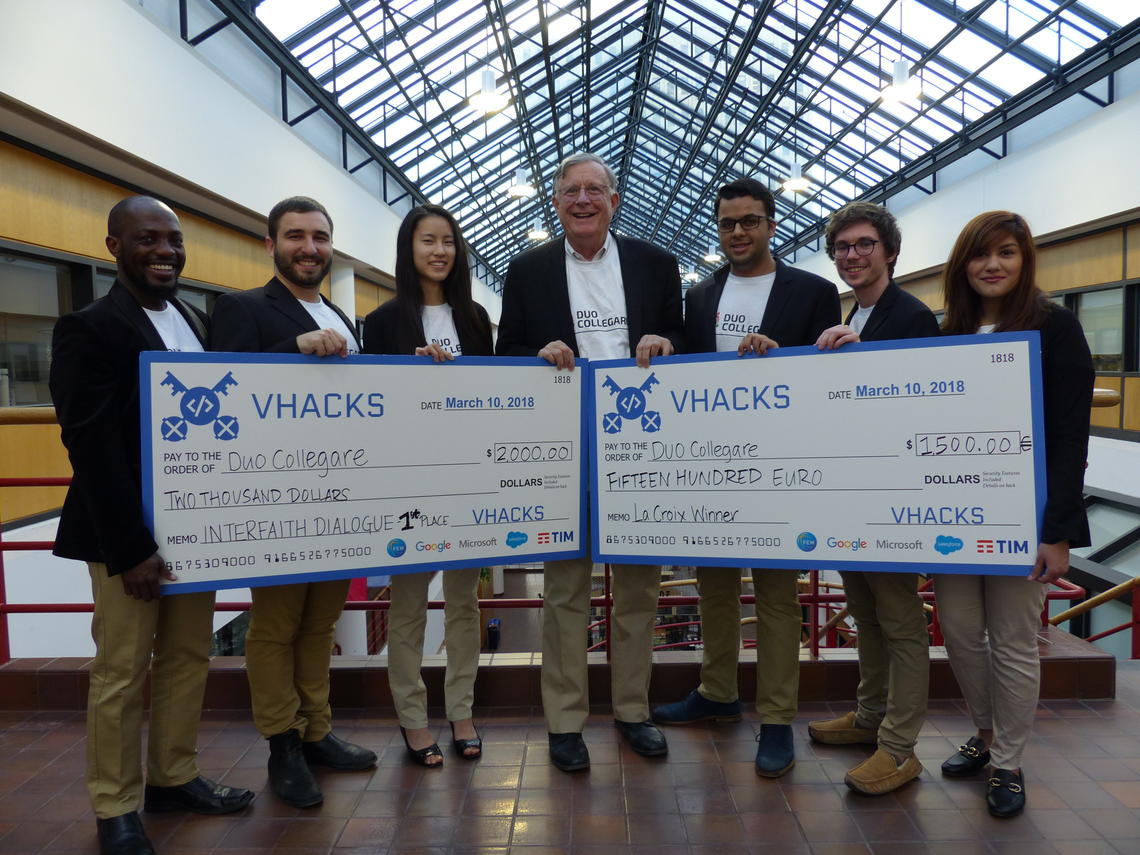March 23, 2018
UCalgary team claims top prize at international Vatican hackathon

Vatican City and a hackathon. Two things you wouldn't expect to go together, but Vatican Hacks (VHacks) is exactly that.
Hosted at one of the holiest places on earth, the competition takes a non-traditional interfaith approach to innovation. Derived from Pope Francis's vision of combining technology with equality and social inclusion, VHacks is based on one simple concept: creating solutions for the greater good. More than 100 students from prestigious universities around the globe descended on the city-state for three days of hacking, strategizing and competition from March 8 to 11, 2018. This is the first year for the event.
The invitation to VHacks is exclusive and the University of Calgary's attendance can be attributed in part to the Haskayne School of Business's success at the 2017 Hult Prize, and in part to leveraging many community connections around the world. One of two Canadian post-secondary institutions invited, Haskayne and the Faculty of Science's Department of Computer Science joined forces to send a talented and capable team of five to Rome, Italy.
Current students Francis Duahn (Haskayne EMBA student), Sharon Wang and Raza Qazi (undergraduate students, Computer Science), and Eric Eidelberg and Sasha Ivanov (graduate students, Computer Science) comprised the team. Bob Schulz, long-time Haskayne professor and coach for student competitions, was assisted by Megha Chopra, BSc'16, Software Engineering and Computer Science.
"I'm so grateful to have been given the opportunity to represent the Haskayne School of Business and the University of Calgary on the world stage," says Francis Duahn, who was a Hult Prize finalist. "The computer science students brought the technical knowledge, and I brought the business sense. We were a strong team and gave it our all."
VHacks is categorized into three areas of focus: social inclusion, interfaith dialogue, and migrants and refugees. Originally the team thought they'd be participating in the migrants and refugee category, a topic Duahn has personal experience with, but a last-minute change placed them into interfaith dialogue.
Not a group to back down from a challenge, the UCalgary team pivoted quickly and came up with a solution that would win them first place in the division. The team also won a prize, sponsored by the international newspaper La Croix, which is awarded to a project that aligns with its mission of creating interfaith dialogue and cross-religion understanding.

Frances Duahn, Eric Eidelberg, Sharon Wang, Bob Schulz, Raza Qazi, Sasha Ivanov, and Meghan Chopra.
Haskayne School of Business
This was the first hackathon experience for master's student Sasha Ivanov. "To be at the Vatican was a totally surreal experience that brought together some of the world's most iconic religious leaders and tech innovators," says Ivanov. "Collaborating with a business student to create an interfaith platform showed me the incredible impact coding for a cause can have. Developing innovative technologies with a real-world application in mind is something I'll carry with me for the rest of my academic and professional career."
The group created DUO Collegare, which is a web platform that promotes not just interfaith dialogue, but interfaith doing. The idea was based on one of life's golden rules: "Do unto others as you would have them do unto you." The word collegare, which literally translates as "to connect" in Italian, pays homage to a gap that currently exists within the interfaith community: lots of talk, not enough action. The platform connects people of every religion and background to timely and varied interfaith-related volunteer opportunities in their community.
The University of Calgary has an outstanding track record of success at competitions both home and abroad, but VHacks was unique.
"Never in a million years did I think technology, business and interfaith would collide at this speed. It was remarkable to experience," explains Schulz. "I've been to countless case competitions over the past 40 years, but this one had a different tone. It was really refreshing to see students focusing their efforts on making a difference, and not just winning an event."
VHacks was sponsored by some high-profile partners include Salesforce.com, Microsoft, Google and Pray.com, and has generated a lot of excitement in both the technology and business world. With this award-winning new web platform in hand, the Calgary team is thinking of scaling it for the Calgary market.
For the time being, they're proud of the work they accomplished while visiting the Vatican and the impactful idea they created to encourage interfaith doing. The team will also be travelling to Edmonton in the near future where they'll be recognized in the Legislative Assembly for this significant achievement.
"At the competition I was able to connect the dots around the world and back to Calgary. Starting right here at home, we're going to make the world a better place using our emerging non-profit ecosystem," says Schulz. "It's encouraging to work on real solutions for social problems." The team learned first-hand that in doing so, a big impact can be made.
